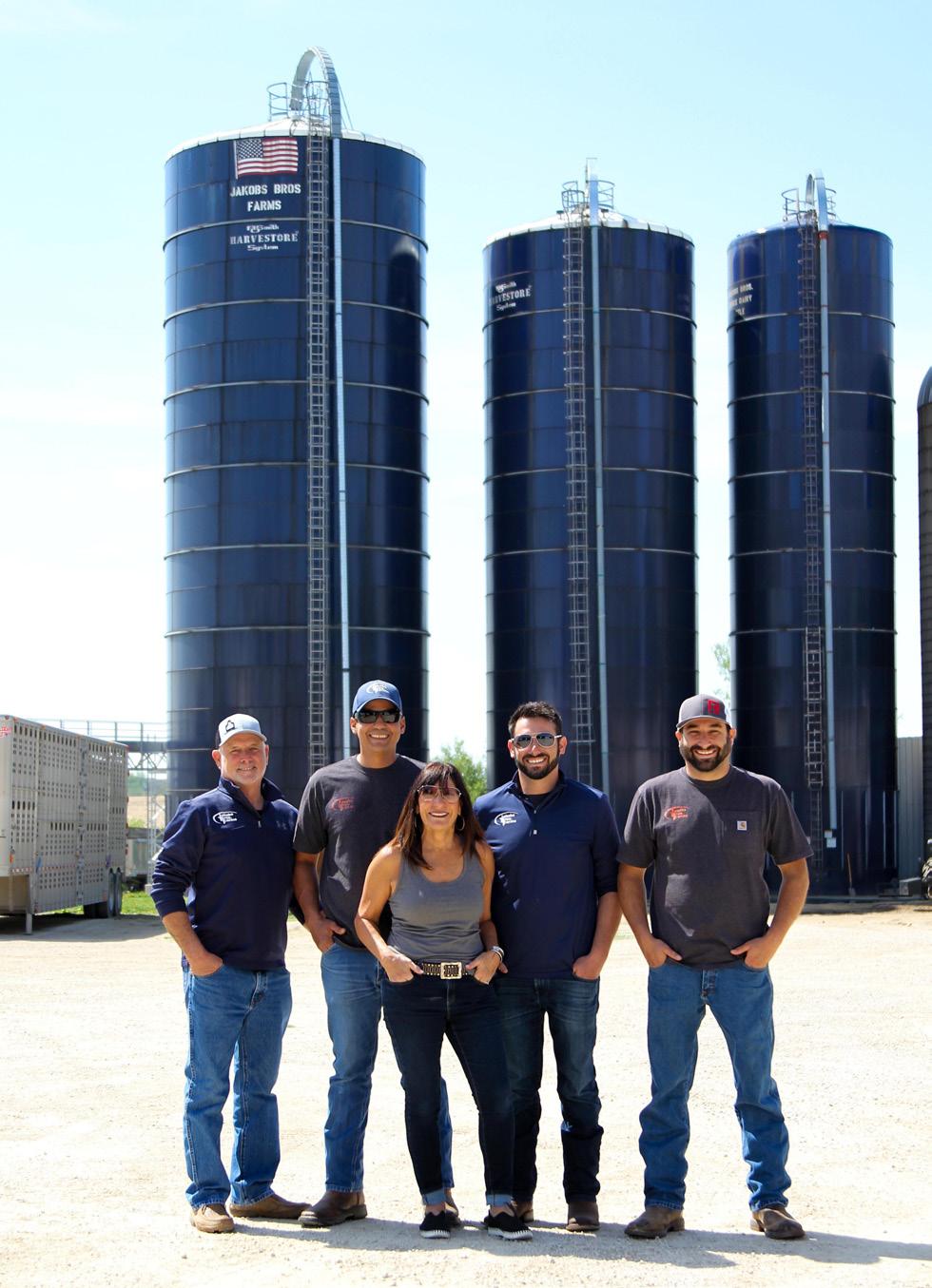
15 minute read
Dependable Systems, Sustainable Foundations
By Olivia Hoots
As individuals, we are motivated by our own unique experiences and interactions. Life’s journey shapes our decisions, our next steps, and our reflections. This is what we often call our heritage – the roots of who we are and the stock we come from. For the Jakobs family of rural Whiteside County, their journey follows the footsteps of a cattleman whose life experience was nothing short of gritty. His love for the land and cattle has passed down through the generations in their family farming operation, instilling courage and resolve in the lives of his sons and grandsons after him. It is a story unmatched by most in modern agriculture, one that spans over 75 years.
Land of Opportunity, and Opportunity for Land
It was after World War II when Norbert Jakobs exited Europe and made his way through Ellis Island at the age of 18-years-old with only $10 to his name. He had just survived two-years of hiding during the Holocaust. After the war, he desired to travel to the United States in pursuit of opportunity, specifically the opportunity to purchase his own land. He started out in New Jersey, teaching himself English along the way, then headed toward the Midwest where he was sure to find cows. He ended up outside of Forreston, Illinois, partnering with a family member who had also emigrated from Holland and started farming.
Yet, those that knew Norbert are not surprised that it was not long after he landed there that he would soon break away in pursuit of his own farm. Staying true to his family’s traditional way of doing business, he started an entrepreneurial enterprise of purchasing breeding bulls, which he leased to local farmers to use. Time at other farms allowed the bull to put on weight, then Norbert would take the bull up to the Chicago Stockyards and sell it to buy a new bull the following year. Even so, Norbert was not satisfied to stop there.
“He was not a patient man,” Norbert and his wife Edith’s son, David Jakobs, said. “His values were mainly in land, especially in coming to America where it is the land of opportunity, where he had the opportunity to acquire land. That was always his two greatest loves, the land and the cattle.”
“As many generations as we can trace back, our family has traded cattle at open markets,” expressed Nik Jakobs, Norbert’s grandson. Once he was able to save up enough money, Norbert purchased land in Illinois, near the small town of Coleta, with his two brothers Dolf and Manfred. Hence, Jakobs Brothers Farms was established. The Jakobs continue to raise cow-calf pairs on the original 40-acre parcel today.
In the 1950s and into the early 1960s the family was focused on dairy cattle, trading them just like they did in “the old country.” Eventually that operation grew to manage 120 cows, but Norbert was set on growth and efficiency, something he believed he could do better in the beef business.
He began purchasing beef cattle from the High Plains region for the hardiness of the animals, a practice David has continued to the present day for the Jakobs farm.
Generations of Brothers
It was in 1979 when David returned to work with his dad, continuing to build on what was already firmly in place. His brother, Tim, would help carry on that legacy for many years alongside his brother. Those years saw major growth on the farm, not just in its capacity for raising beef, but also as David and his wife, Margo, raised their three boys – Nik, Alex and Bryce. Both Nik and Alex, along with their brother Ricky Gonzalez, are managers on the operation today, but each of their stories is unique.
There is an old drawing in Alex’s office from when he was a kid. On it he writes, “I’m going to be a farmer. I would drive tractors.” He recalls the tight relationship between himself and his grandfather, Norbert, especially when he would ride-along at feeding time or help fix fence. Alex often admired his grandfather’s care of the pasture. “His pasture was his pride and joy, it was the first piece of land he bought,” Alex detailed. For a while Alex assumed he would be the main son to take over the farm, since Nik and their younger brother, Bryce, had interests in other types of careers. After college at Iowa State University he realized it was an opportunity he could not pass up, one that began as a duty but is something he ended up loving and enjoying.
It took Nik a little longer to recognize he needed the operation in his life, his career path was in finance for many years after getting his degree from the University of Illinois. After a family event, he decided he had a responsibility to return to the farm for a short period to absorb what he titles the “tribal knowledge” of the farm. When a year had gone by, he realized he loved it there. “I was starting a family, and it reminded me why I needed to be here to raise my children,” he said. “I would rather build something and work with people that I love and care about than work with people who are acquaintances.” For Nik, it is about sharing successes with those he loves.
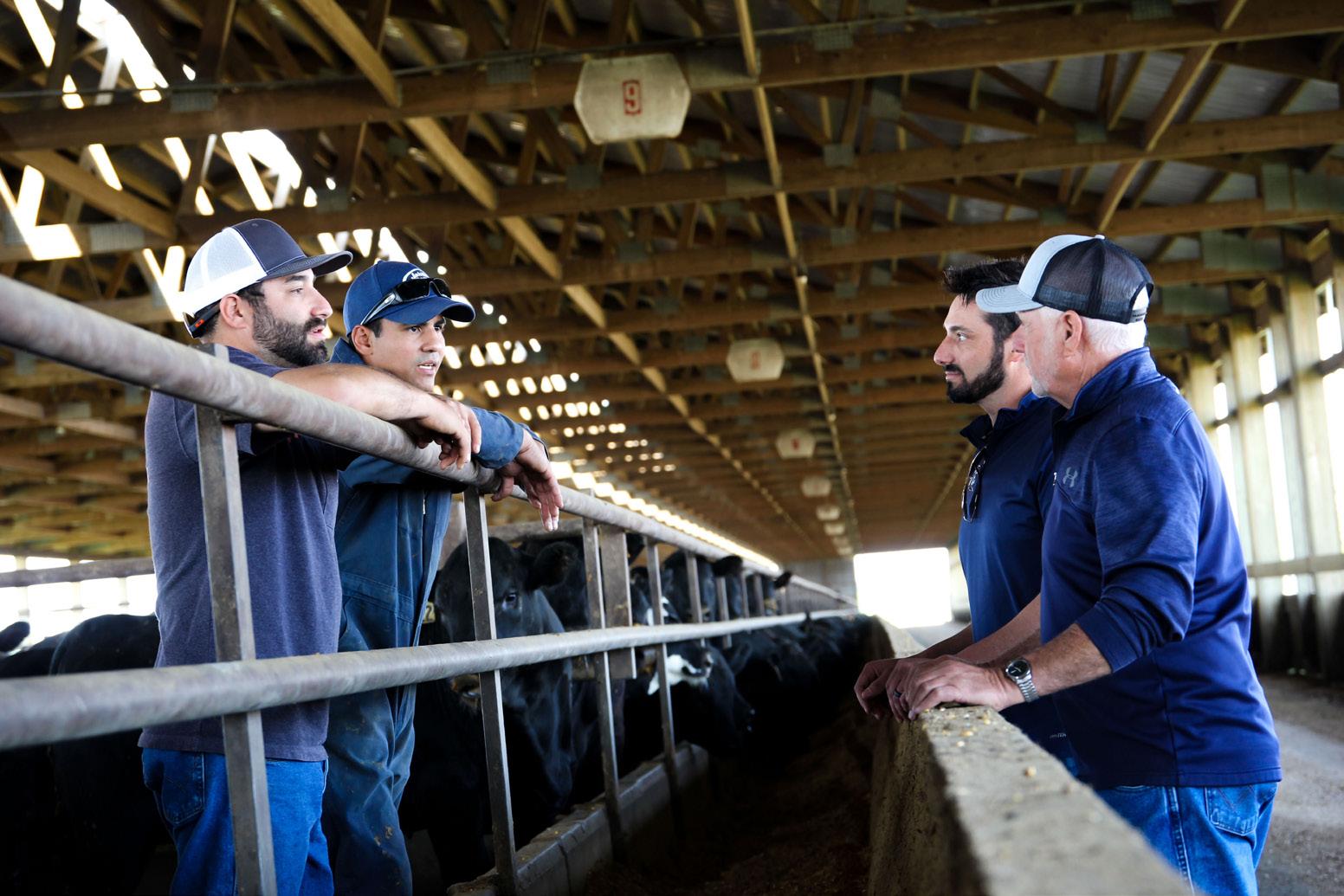
Ricky came to the United States at the age of 18 as a foreign exchange student from Panama. He easily connected with people in the rural community and enjoyed helping on the farm, eventually becoming part of the brotherhood. After he finished high school, then college at Rockford College, received his master’s in business administration, and interned at an aerospace company, he approached David one day when they were on a golf excursion.
The youngest brother, Bryce, has a bachelor’s in journalism from the University of Illinois and is a successful journalist today. Through all of it, David prioritized letting his sons decide what they wanted to do with their life. “My dad never once forced me to come back to this business, because of that is why I am here today,” Nik said. “He let me follow my own path.”
Yet, as the sons would tell you, there were stipulations to making the farm their livelihood. They each had to graduate college, work somewhere else for at least a short period of time, and prove they could bring added value to the farm.
How to Manage a “Corporate Family Farm”
There are currently five individuals that have assumed management positions for the daily function of the operation. Nik takes care of anything financial, marketing and community related. He has prioritized community involvement in the last few years. “My mom, Margo, has always led by example being incredibly involved in the community and doing for others,” Nik expressed. “I have tried to carry that torch for her. We want to not just build a legacy, but also carry our weight in making this community better.”
Alex and Ricky manage the facilities, animal husbandry, feeding and employees. While Alex might prefer the cattle side of the business, he is beginning to assume more of a leadership role as his dad begins to step back. “My legacy is asking me to be in management, allowing the business to go in the right direction.” Now, David sees Ricky as a tremendous herdsman and attributes much of the farm’s growth within the last ten years to his time there.
Arden Queckboerner, their shop manager, oversees keeping all the equipment serviced and maintained. In describing Arden’s relationship to the farm, Nik said “he loves farming as much as anyone I know.” That is reflected in the many years he has dedicated to the operation, even bringing three of his sons and his daughters to help on the farm at different points. From the family’s perspective, Arden is vital to the business.
Finally, David currently finds the most joy in leading construction projects.
“My dad has now transitioned into a strategic role and whatever-he-feels-like-working-on-role,” Nik laughed. “As the patriarch deserves.”
One of the most important pieces of David’s job he still does today is the purchasing of each year’s cattle. Buying cattle and manning the combine and planter in their particular seasons are tasks he has not given up yet. “He always likes to be doing something,” Alex said.
At the beginning of each day the five managers gather to discuss what needs to be accomplished, then they each disperse and assign tasks to their employees, there are roughly 15-20 people who work on the farm, both full and part-time, depending on the time of year. Nevertheless, all their roles seem to overlap as they are each ready to solve whatever problem is in front of them.
Kevin Miller, who began working on the farm in 1974, has been there longer than anyone and still works a couple of days a week. Not only that but he was the first of four generations to work on the farm. “This is home,” he said.
Nik has titled it a “corporate family farm” because of their efforts to provide families the opportunity to have their own sons and daughters work side-by-side them, just like his own. Employees will also testify to the farm feeling like a family in itself.
Robert Tourtillott shares an example of what it is like to work on the farm. “They do not talk to me like an employee, but as someone who is helping them out,” he emphasized.
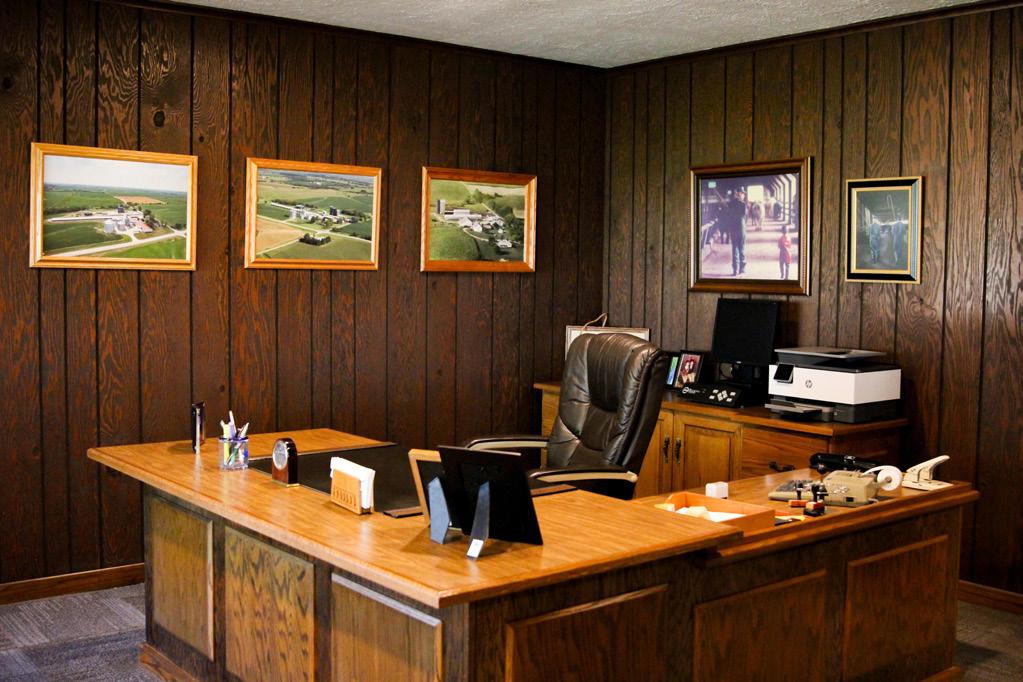
“At the end of the day they always say ‘thanks for your help,’ like a farmer helping out another farmer.”
Cole VanDyke, one of the managers of the cow-calf farm located on the original 40-acres, said, “my wife and I had a baby and Alex and his wife brought supper over. They treat you like family.”
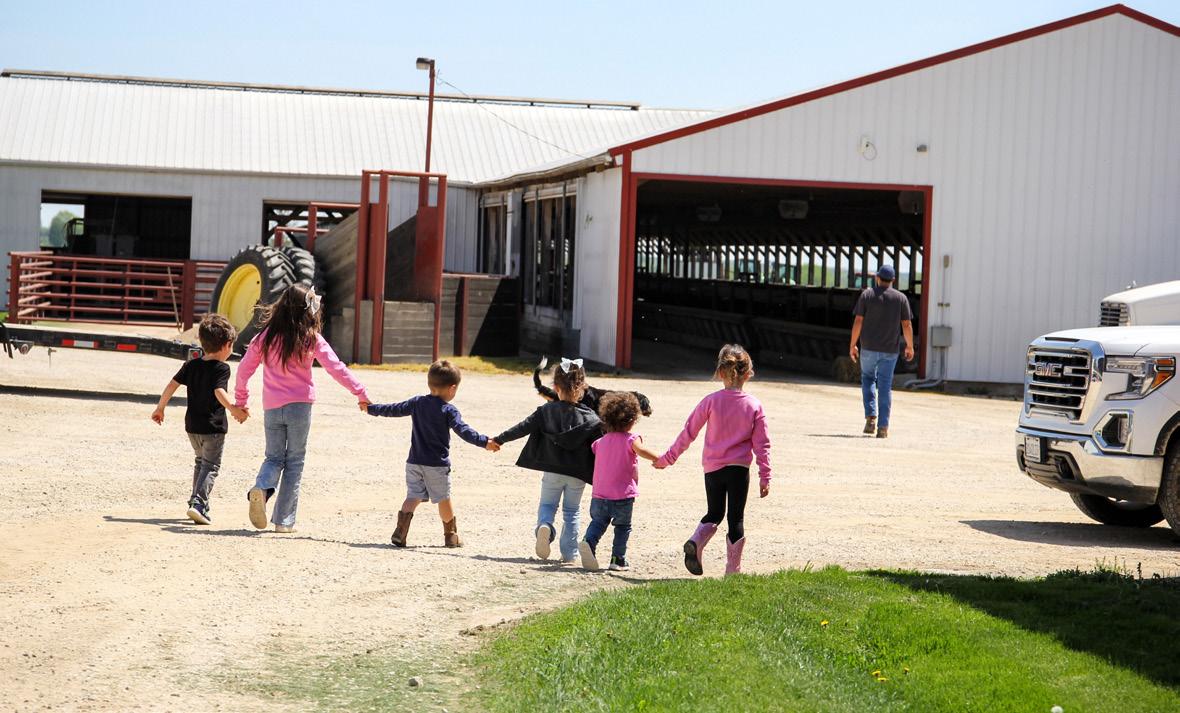
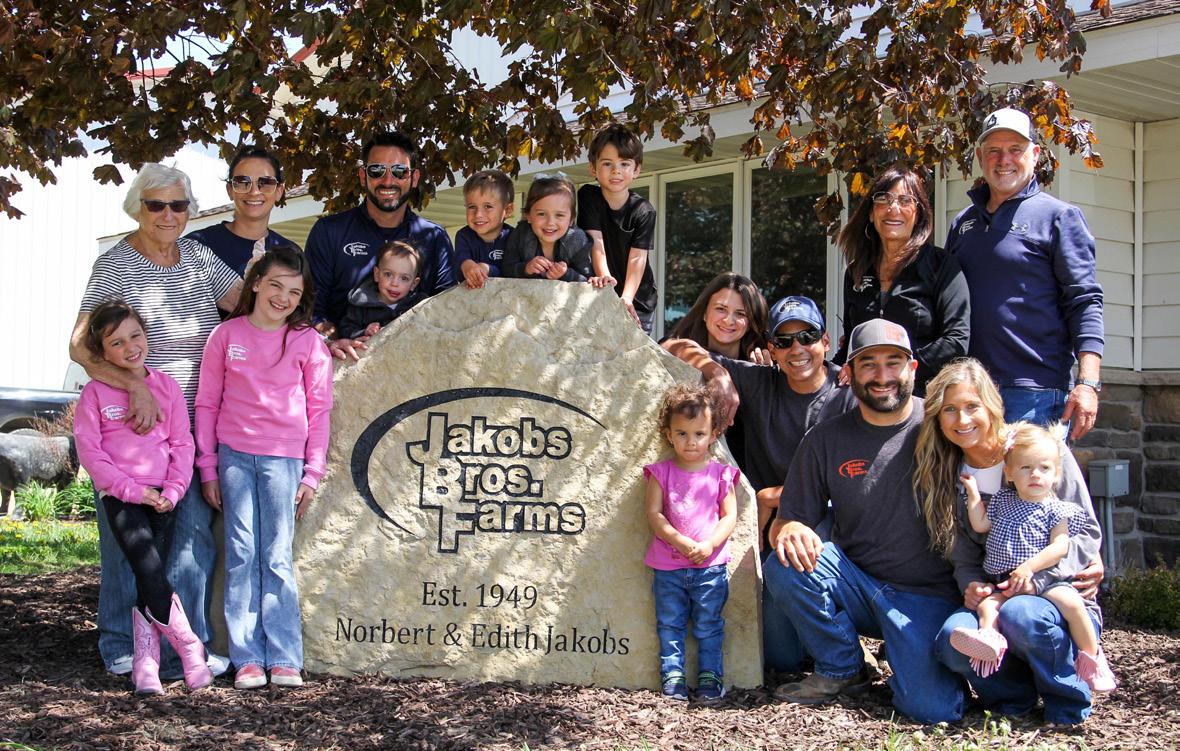
Cultivating Stewardship
Each of the Jakobs men of today recall the moments leading up to Norbert’s passing, because he was still asking what they were hoping the future of the farm would be. It is that kind of enthusiasm for “better” that has been instilled in each of them and is evident in their story of the past 74 years.

The farm itself is known as an early innovator of finishing practices using slated barns, the first one being placed in 1971. At that time, barns were mostly concrete and dirt lots, but the slats allow for catching manure to fertilize the crop land. “My father recognized the value of manure, he came from Europe where manure was not an asset,” David said. “For the entirety of our operation we have been able to utilize that ingredient to make the land and environment better.” New barns were added in 1980, 1991 and 2015, and a remodel is underway this year as well.
Lately, Alex has been pursuing the betterment of the farm through product testing. “I really like doing trials,” he said. One example he gives is their pursuit to control hairy heal warts through easy diagnoses and prolonged regulation. “We try to produce the animal as efficiently as possible while also keeping it as comfortable as it can be,” Alex said.
David is proud of the animal quality that has become standard for their operation. “In this industry we are not cookie cutter like pork and poultry where you can get the same animal over and over again,” he said. “The livestock industry likes to maintain its independence. That is why we have a lot of variety and differences in our breeds.” David has seen this improve genetics resulting in an average weight that has increased “substantially” when compared to past years. “We have done a better job at creating a meteor type animal that can produce more weight.”
Nevertheless, David believes in seeking profitability for all sectors of the beef industry. They value other corners of the industry through the diversification on their own farm and when they purchase cattle from cow-calf operations to background.
The scale of the Jakobs brothers’ operation is understood when looking at just how diversified it really is. “I have seen this thing grow from a little thing to something pretty enormous,” Kevin said. All mechanical work, most of the vet work, manure application, and much of the construction, is done within the scope of those on the farm. “Today you have to be a jack of all trades and a master of many,” Nik said.
No matter the size, the Jakobs believe in focusing on quality, but even more so, on being positive examples of cattle and land stewardship.
Closed Ecosystem
Increased diversification did not happen by accident, but as an effort to steward their cattle and land to the best of their ability. The Jakobs hold to four principles, the first one being to be the best you can be, then followed by having the resources to provide jobs to the community, make a lasting impact on it, and create an overall healthy environment for cattle production.
Nik has been working with some organizations to prove the correlation between good stewardship and profitability for farmers. “One of the biggest fallacies in agriculture is that poor stewardship somehow leads to profitability,” he said. His work has included carbon monitoring and collaborating with accounting firms to map out the facts regarding the impact of the cattle industry. “I believe we’re better stewards than the media portrays us to be.”
And, Nik believes the Jakobs operation is a great example of that. “We are a closed ecosystem,” he said. They begin each season by placing manure on their fields that was been stored to preserve the nitrogen. As a result, the operation produces all the needed phosphorus, potassium and micronutrients needed for their yearly grain production. “We create an environment where we believe we are being incredible stewards of the land by providing excellent fertility, and producing grain that has the lowest carbon footprint on planet earth.”
Not only that, but after selling harvested corn to an ethanol facility, they bring distillers grains back to the farm to feed the cattle. “We have a closed system if everything stays on-farm; we can provide all the feed for our cattle,” Nik explained. “We talk about the need to have decentralized ecosystems because a decentralized food system is good for our national security.” This overall cycle reduces the intake of food and water needed per animal by using the resources they have available.
Nik hopes his efforts will extend beyond his own community and into the lives of producers – encouraging them to advocate – and consumers – showing them the value of the farmer. “I believe in the United States, specifically the Midwest, we have the best processes, technologies, infrastructure and soil fertility,” Nik said. “I am trying to help the beef industry to not wait for people to shape our future but take the bull by the horns and lead in the producers interest.” He believes almost every producer has it in their nature to be a good steward, and believes all producers have a responsibility to share the same message.
Boots Planted Firmly
Each member of the Jakobs family seems to know what makes their farm worth working on every day. Alex believes the farm would not be anything without those who contribute their time to the operation, such as nutritionists and their employees, and even more so, one another. “We are not anything without the people we surround ourselves with,” he said. He is grateful to raise his kids in an agriculture environment where he can raise them to understand the value of this type of work.
Nik agrees. “[The farm] provides an opportunity to keep your family all together. To be able to raise my kids with their cousins, aunts, uncles and grandparents. That is something we all highly value,” he expressed.
Ricky appreciates the sentimentality that comes with seeing the finished product and sharing that with friends and family. “Getting to taste a product we raised from 600 to 1,500 lbs., that is really cool,” he said. “How cool is it that we get to raise cattle and feed the world, and with a really good product.”
David has no shortage of faith that the farm will continue to flourish under the care of his sons as it has for so long. He would employ anyone to have confidence in the work you have put in, it has a lasting effect on those who succeed you. He stewarded his own father’s vision and raised children who invest their lives into raising the beef they are proud of today, each preserving a rich family heritage, and stewarding their love for family, land, cattle and community.




